 Libri di Adorno Theodor W. su Unilibro.it) Libri di Adorno Theodor W. su Unilibro.it)
|
|
2011 |
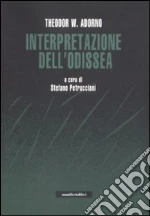 Title :
Interpretazione dell'Odissea. Con un dialogo sul mito tra Adorno e Karl Kerényi
Title :
Interpretazione dell'Odissea. Con un dialogo sul mito tra Adorno e Karl KerényiAuthor: Adorno Theodor W.; Petrucciani S. (cur.) Publisher: Manifestolibri In questo volume si pubblica per la prima volta in Italia un importante inedito adorniano. Si tratta della prima versione, poi tagliata in molte parti, del capitolo che nella "Dialettica dell'illuminismo" di Adorno e Horkheimer è dedicato a Ulisse, interpretato come archetipo dell'individuo borghese moderno. Adorno ritrova, nelle astuzie del temerario navigatore omerico, la figura originaria della razionalità occidentale che si mostra nella sua dialettica ambiguità: potenza demitizzante ed emancipativa, ma anche segreta complice del dominio. Completa il volume un'inedita conversazione radiofonica, registrata nel 1952, tra il filosofo francofortese e il grande studioso della mitologia classica Karl Kerényi. € 14,00
|
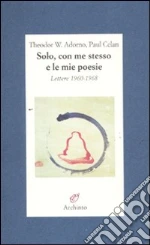 Title :
Solo, con me stesso e le mie poesie. Lettere 1960-1968
Title :
Solo, con me stesso e le mie poesie. Lettere 1960-1968Author: Adorno Theodor W.; Celan Paul; Seng J. (cur.) Publisher: Archinto Quindici lettere sono il ridotto ma prezioso corpus che compone la corrispondenza tra Paul Celan e Theodor W. Adorno in un arco di tempo di più di otto anni, tra il 1960 e il 1968, che coincide con il lento e disperato ripiegarsi del poeta nell'incapacità di vivere e di convivere, progressivamente ammessa e suggellata infine con il suicidio del 1970. Impossibilitato, per riprendere una formula dello stesso Adorno, a "parlare dell'orrore attraverso il silenzio", Celan si rivela, nel suo approccio con una figura da lui riverita come poche altre, in tutta la sua disarmata fragilità, esibita "confessionalmente" al cospetto di un interlocutore la cui ammirazione, forse imbarazzata, certo colpevolmente tardiva, resta comunque schermata da una condiscendenza e da un'incomprensione che replicano - a un livello di intensità che solo il lettore è in grado di mettere a fuoco con tutte le sue drammatiche implicazioni - il celebre episodio del mancato incontro tra i due uomini in Engadina, immortalato nel 1959 dalla celaniana "Conversazione nella montagna". € 15,00
|
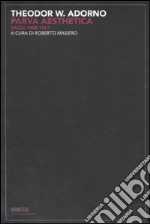 Title :
Parva aesthetica. Saggi 1958-1967
Title :
Parva aesthetica. Saggi 1958-1967Author: Adorno Theodor W.; Masiero R. (cur.) Publisher: Mimesis Nell'ultimo decennio di vita Adorno torna più volte su temi di carattere estetico che caratterizzano non solo il suo approccio all'arte moderna, ma il rapporto con il pensiero filosofico nel suo complesso. Il concetto di Aesthetica, volutamente citato in latino, costituisce una porta d'accesso a questioni di carattere metodologico, gnoseologico, ontologico e sociale, in un continuo confronto con la negatività che abita all'interno della stessa cultura. La formulazione di un'estetica normativa appare impropria agli occhi del filosofo tedesco: per questo motivo egli ritiene impossibile affidare al pensiero il compito di costruire modelli e valori artistici universali. La scelta di Adorno, nei saggi qui raccolti, consiste piuttosto nell'elaborare forme di pensiero critico, nella convinzione che di norme e modelli non si potrà parlare come valori assoluti, ma unicamente come dimensioni problematiche. € 19,00
Scontato: € 18,05
|
|
1911 |
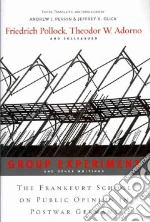 Title :
Group Experiment and Other Writings
Title :
Group Experiment and Other WritingsAuthor: Pollock Friedrich, Adorno Theodor W., Perrin Andrew J. (EDT), Olick Jeffrey K. (EDT) Publisher: Harvard Univ Pr During the occupation of West Germany after the Second World War, the American authorities commissioned polls to assess the values and opinions of ordinary Germans. They concluded that the fascist attitudes of the Nazi era had weakened to a large degree. Theodor W. Adorno and his Frankfurt School colleagues, who returned in 1949 from the United States, were skeptical. They held that standardized polling was an inadequate and superficial method for exploring such questions. In their view, public opinion is not simply an aggregate of individually held opinions, but is fundamentally a public concept, formed through interaction in conversations and with prevailing attitudes and ideas “in the air.” In Group Experiment, edited by Friedrich Pollock, they published their findings on their group discussion experiments that delved deeper into the process of opinion formation. Andrew J. Perrin and Jeffrey K. Olick make a case that these experiments are an important missing link in the ontology and methodology of current social-science survey research. € 65,90
|
|
|
2010 |
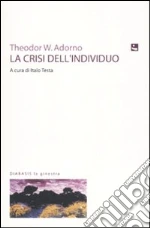 Title :
La Crisi dell'individuo
Title :
La Crisi dell'individuoAuthor: Adorno Theodor W.; Testa I. (cur.) Publisher: Diabasis La crisi del liberalismo e della famiglia borghese, gli esperimenti totalitari del nazionalsocialismo e del capitalismo di stato sovietico, l'avvento della società di massa e dell'industria culturale sono per Theodor W. Adorno momenti di una grande trasformazione, destinata ad abbattere la struttura psicologica tradizionale del soggetto autonomo. La disarticolazione dell'esistenza singolare è così la chiave per decifrare le patologie sociali del presente e per delineare i tratti del nuovo tipo umano in formazione. Gli scritti qui raccolti documentano come le meditazioni di Adorno sulla crisi dell'individuo e sulla distruzione dell'esperienza si intreccino con il progetto di una "nuova antropologia" che faccia i conti con la metamorfosi bio-politica in atto. Nel mondo delle grandi organizzazioni i dispositivi di amministrazione della vita plasmano sempre più dall'interno il soggetto sin nel suo elemento naturale. Di tale mutazione è segno la centralità del corpo nudo che si manifesta in fenomeni diversi ma convergenti quali l'estetica mortuaria del fascismo, la fisicità anestetizzata del cinema, l'igiene sportiva di massa. Ma questo profondo rivolgimento non comporta solo la liquidazione della vecchia forma di vita e della struttura monadica dell'io. La crisi è anche l'occasione per un ripensamento ex novo dell'individualità sia nel suo potenziale critico sia nel suo ruolo creativo di forme inedite di azione solidale. € 18,00
|
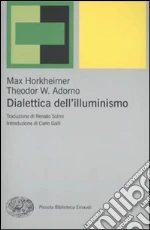 Title :
Dialettica dell'illuminismo
Title :
Dialettica dell'illuminismoAuthor: Horkheimer Max; Adorno Theodor W. Publisher: Einaudi Scritta in stretta collaborazione dai due pensatori tedeschi durante la guerra, l'opera risponde al bisogno di tradurre sul piano speculativo una duplice esperienza: quella dell'Europa devastata dal fascismo, che gli autori si erano lasciata alle spalle, e quella della società americana che li aveva accolti. Entrambe le esperienze provano - ed è la tesi del libro - che l'illuminismo ha la tendenza a rovesciarsi nel suo contrario, non solo nell'aperta barbarie del fascismo, ma anche nell'asservimento totalitario delle masse attraverso la blandizie dell'industria culturale. Secondo gli autori, la libertà nella società è inseparabile dal pensiero illuministico. Il concetto stesso di questo pensiero, tuttavia, implica già il germe di quella regressione che oggi si verifica ovunque. Per questo essi affermano che se l'illuminismo non accoglie in sé la coscienza di questo momento regressivo, firma la propria condanna, e che è un dovere di tutti riflettere sull'aspetto distruttivo del progresso. Gli autori vollero qui dare un contributo, poi risultato essenziale, a questa che è una "comprensione teoretica dell'oggi". Già edita una prima volta nel '47, l'opera è tra l'altro uscita nei "Paperbacks" nel 1980. € 24,00
Scontato: € 22,80
|
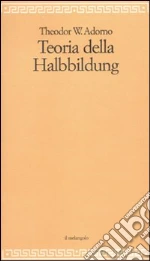 Title :
Teoria della Halbbildung
Title :
Teoria della HalbbildungAuthor: Adorno Theodor W.; Sola G. (cur.) Publisher: Il Nuovo Melangolo Theodor W. Adorno, il filosofo tedesco esponente della Scuola di Francoforte, scrive nel 1959 un breve saggio intitolato "Theorie der Halbbildung", ripubblicato di recente in Germania dalla Suhrkamp. La presente edizione italiana, curata da Giancarla Sola, ha per titolo "Teoria della Halbbildung". Mantiene, dunque, volutamente immutata la parola tedesca attorno alla quale ruota il testo di Adorno. Il libro parte dalla storia di due concetti: quello di formazione (Bildung) e quello di cultura (Kultur), per precisare poi come entrambi siano stati logorati nel corso della modernità al punto che la formazione dell'uomo contemporaneo è ormai profondamente compromessa. Per chiarire tale fenomeno, Adorno parla di Halbbildung: ossia, di una formazione superficiale, parziale, incompleta, dimidiata e perfino disumanizzata, intesa quale esito di una società in cui i mezzi di comunicazione di massa e l'industria culturale hanno prodotto un processo generalizzato di omologazione. Il tema, di considerevole attualità, richiama non solo la questione della libertà di stampa, ma anche quella di pensiero e di critica. Ed è appunto nel solco della critica sociale franco-fortese che il testo di Adorno si colloca, consegnandosi al lettore in tutta la sua forza filosofica, sociologica e pedagogica. € 12,00
|
|
2009 |
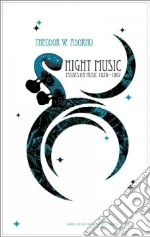 Title :
Night Music
Title :
Night MusicAuthor: Adorno Theodor W. (EDT), Hoban Wieland (TRN) Publisher: Seagull Books Although Theodor W. Adorno is best known for his association with the Frankfurt School of Critical Theory, he began his career as a composer and successful music critic. Night Music presents the first complete English translations of two collections of texts compiled by German philosopher and musicologist Adorno—Moments musicaux, containing essays written between 1928 and 1962, and Theory of New Music, a group of texts written between 1929 and 1955.
In Moments musicaux, Adorno echoes Schubert's eponymous cycle, with its emphasis on aphorism, and offers lyrical reflections on music of the past and his own time. The essays include extended aesthetic analyses that demonstrate Adorno's aim to apply high philosophical standards to the study of music. Theory of New Music, as its title indicates, presents Adorno's thoughts and theories on the composition, reception, and analysis of the music that was being written around him. His extensive philosophical writing ultimately prevented him from pursuing the compositional career he had once envisaged, but his view of the modern music of the time is not simply that of a theorist, but clearly also that of a composer. Though his advocacy of the Second Viennese School, comprising composer Arnold Schoenberg and his pupils, is well known, many of his writings in this field have remained obscure. Collected in their entirety for the first time in English, the insightful texts in Night Music show the breadth of Adorno's musical understanding and reveal an overlooked side to this significant thinker.
€ 26,80
|
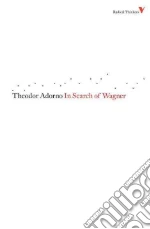 Title :
In Search of Wagner
Title :
In Search of WagnerAuthor: Adorno Theodor W., Zizek Slavoj (FRW), Livingstone Rodney (TRN) Publisher: Verso Books Written in exile from Germany, this potent study of Europe's most controversial composer explodes the frontiers of musical and cultural analysis. Measuring key elements of Wagner's oeuvre with patent musical dexterity, Adorno sheds light on a nineteenth-century bourgeois figure whose operas betray the social gestures and high-culture fantasies that helped plant the seeds of the modern Culture Industry. A foreword by Slavoj Zizek situates Adorno's reflections within present debates over Wagner's anti-Semitism and the moral status of his work, proving why this book remains one of the most important character studies of the twentieth century. € 12,00
|
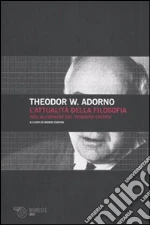 Title :
L'attualità della filosofia. Tesi all'origine del pensiero critico
Title :
L'attualità della filosofia. Tesi all'origine del pensiero criticoAuthor: Adorno Theodor W.; Farina M. (cur.) Publisher: Mimesis Cosa pensava Adorno prima d'essere costretto a fuggire negli Stati Uniti? Quali temi filosofici erano al centro della sua riflessione prima che l'orrore dell'olocausto occupasse prepotentemente lo spazio teoretico dell'elaborazione? Qui raccolti tre scritti inediti stesi da Adorno tra il 1931 e il 1933. I lavori di un intellettuale libero, come fu sempre, ma non ignaro dei compiti che la filosofia doveva darsi nella società. Testi che raccontano il rapporto del celebre francofortese con la filosofia classica tedesca, preziosi per conoscere gli esordi del pensiero di uno dei massimi filosofi internazionali del Novecento. € 12,00
|
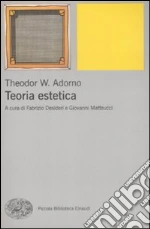 Title :
Teoria estetica
Title :
Teoria esteticaAuthor: Adorno Theodor W.; Desideri F. (cur.); Matteucci G. (cur.) Publisher: Einaudi L'ultimo libro, postumo, di Adorno è senz'altro l'opera più concettualmente aspra del filosofo francofortese. L'asprezza deriva dal compito che l'autore si è visto assegnare dal proprio oggetto: pensare l'opera d'arte dall'interno spingendola al concetto pur sapendo che essa è qualcosa di altro dal concetto. Pensarla senza cedere alle facili sirene dell'empatia e del vissuto; non in un'astratta essenza, bensì nella complessa fenomenicità delle sue manifestazioni storiche. Pensare l'opera d'arte, dunque, nella sua appartenenza al mondo delle merci, ma fino in fondo, ossia come una mercé assoluta che nega se stessa, non facile asilo di una interiorità e di una soggettività in via di sparizione, bensì "cosa" che si rifiuta alla reificazione. Pensare il negativo che si mostra come il vero e proprio interno dell'opera d'arte contemporanea, senza consegnarlo ad un'ontologia edificante, ma cogliendovi piuttosto l'attestazione oggettiva che il circolo dell'effettualità non è perfetto e chiuso in se stesso. € 30,00
Scontato: € 28,50
|
||
|
2008 |
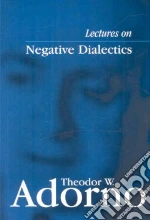 Title :
Lectures on Negative Dialectics
Title :
Lectures on Negative DialecticsAuthor: Adorno Theodor W., Tiedemann Rolf (EDT), Livingstone Rodney (TRN) Publisher: John Wiley & Sons Inc This volume comprises one of the key lecture courses leading up to the publication in 1966 of Adorno's major work, Negative Dialectics. These lectures focus on developing the concepts critical to the introductory section of that book. They show Adorno as an embattled philosopher defining his own methodology among the prevailing trends of the time. As a critical theorist, he repudiated the worn-out Marxist stereotypes still dominant in the Soviet bloc – he specifically addresses his remarks to students who had escaped from the East in the period leading up to the building of the Berlin Wall in 1961. Influenced as he was by the empirical schools of thought he had encountered in the United States, he nevertheless continued to resist what he saw as their surrender to scientific and mathematical abstraction. However, their influence was potent enough to prevent him from reverting to the traditional idealisms still prevalent in Germany, or to their latest manifestations in the shape of the new ontology of Heidegger and his disciples. Instead, he attempts to define, perhaps more simply and fully than in the final published version, a 'negative', i.e. critical, approach to philosophy. Permeating the whole book is Adorno's sense of the overwhelming power of totalizing, dominating systems in the post-Auschwitz world. Intellectual negativity, therefore, commits him to the stubborn defence of individuals – both facts and people – who stubbornly refuse to become integrated into 'the administered world'. These lectures reveal Adorno to be a lively and engaging lecturer. He makes serious demands on his listeners but always manages to enliven his arguments with observations on philosophers and writers such as Proust and Brecht and comments on current events. Heavy intellectual artillery is combined with a concern for his students' progress. € 28,10
|
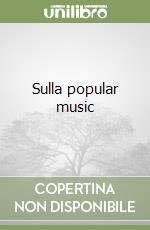 Title :
Sulla popular music
Title :
Sulla popular musicAuthor: Adorno Theodor W.; Santoro M. (cur.) Publisher: Armando Editore € 9,00
Scontato: € 8,55
|
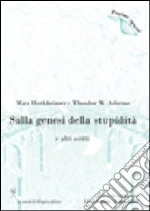 Title :
Sulla genesi della stupidità e altri scritti
Title :
Sulla genesi della stupidità e altri scrittiAuthor: Horkheimer Max; Adorno Theodor W. Publisher: La Scuola di Pitagora € 2,00
Scontato: € 1,90
|
|
2007 |
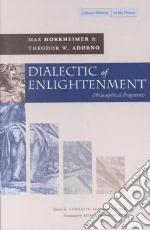 Title :
Dialectic of Enlightenment
Title :
Dialectic of EnlightenmentAuthor: Horkheimer Max, Adorno Theodor W., Schmid Noerr Gunzelin, Jephcott Edmund (TRN) Publisher: Stanford Univ Pr Dialectic of Enlightenment is undoubtedly the most influential publication of the Frankfurt School of Critical Theory. Written during the Second World War and circulated privately, it appeared in a printed edition in Amsterdam in 1947. "What we had set out to do," the authors write in the Preface, "was nothing less than to explain why humanity, instead of entering a truly human state, is sinking into a new kind of barbarism." Yet the work goes far beyond a mere critique of contemporary events. Historically remote developments, indeed, the birth of Western history and of subjectivity itself out of the struggle against natural forces, as represented in myths, are connected in a wide arch to the most threatening experiences of the present. The book consists in five chapters, at first glance unconnected, together with a number of shorter notes. The various analyses concern such phenomena as the detachment of science from practical life, formalized morality, the manipulative nature of entertainment culture, and a paranoid behavioral structure, expressed in aggressive anti-Semitism, that marks the limits of enlightenment. The authors perceive a common element in these phenomena, the tendency toward self-destruction of the guiding criteria inherent in enlightenment thought from the beginning. Using historical analyses to elucidate the present, they show, against the background of a prehistory of subjectivity, why the National Socialist terror was not an aberration of modern history but was rooted deeply in the fundamental characteristics of Western civilization. Adorno and Horkheimer see the self-destruction of Western reason as grounded in a historical and fateful dialectic between the domination of external nature and society. They trace enlightenment, which split these spheres apart, back to its mythical roots. Enlightenment and myth, therefore, are not irreconcilable opposites, but dialectically mediated qualities of both real and intellectual life. "Myth is already enlightenment, and enlightenment reverts to mythology." This paradox is the fundamental thesis of the book. This new translation, based on the text in the complete edition of the works of Max Horkheimer, contains textual variants, commentary upon them, and an editorial discussion of the position of this work in the development of Critical Theory. € 26,20
|
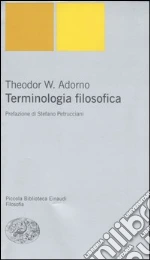 Title :
Terminologia filosofica
Title :
Terminologia filosoficaAuthor: Adorno Theodor W. Publisher: Einaudi Queste "lezioni", che Adorno tenne all'Università di Francoforte tra il 1962 e il 1963, si propongono in primo luogo di offrire un esame storico e tematico di alcuni concetti fondamentali della filosofia (universale e particolare, soggetto e oggetto, dialettica, essere, coscienza ecc.), poiché, come scrive lo stesso Adorno, "alla filosofia il suo linguaggio è essenziale, e i problemi filosofici sono in larga misura problemi di linguaggio". Questa introduzione alla terminologia diventa dunque una vera e propria introduzione alla filosofia, condotta al di fuori dei tradizionali schemi manualistici e sistematici, con un linguaggio accessibile che nulla sacrifica al rigore critico, e senza false semplificazioni. Adorno concentra la sua riflessione attorno a certi punti focali, nei modi storico-dialettici che gli sono propri. Procedendo per grandi "tagli", egli affronta i principali movimenti della storia del pensiero (idealismo e realismo, empirismo e razionalismo, spiritualismo e materialismo), dandoci una sorta di panorama della filosofia, in particolare di quella moderna, per temi e problemi, ricco di aperture, di spunti e di suggestioni. € 26,00
Scontato: € 24,70
|
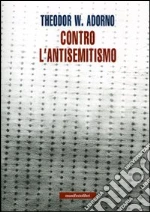 Title :
Contro l'antisemitismo di oggi
Title :
Contro l'antisemitismo di oggiAuthor: Adorno Theodor W.; Petrucciani S. (cur.) Publisher: Manifestolibri Il problema dell'antisemitismo torna a preoccupare l'Europa e Israele. In quattro brillanti saggi, che non hanno perso niente della loro attualità, il maestro della teoria critica riflette sulle radici sociali e psicologiche del pregiudizio antisemita, sulla mentalità autoritaria, sui tentativi che anche oggi riaffiorano di minimizzare il nazismo e lo sterminio di un intero popolo. Anche nelle tolleranti democrazie occidentali, ammonisce Adorno, l'odio antiebraico è tutt'altro che sconfitto: conformismi, etnocentrismi e nazionalismi sono infatti il retroterra arcaico e a un tempo modernissimo da cui l'antisemitismo, raramente esplicito, più spesso rimosso e occultato, può tornare a rinascere e a farsi minaccioso. € 14,00
|
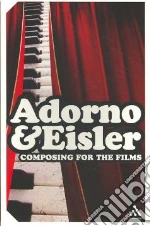 Title :
Composing for the Films
Title :
Composing for the FilmsAuthor: Adorno Theodor W., Eisler Hanns, McCann Graham (INT) Publisher: Continuum Intl Pub Group Theodor Adorno was the foremost thinker of the Frankfurt School of philosophers, this classic account of film music aesthetics is a fantastic addition to the Impacts series. € 25,60
|
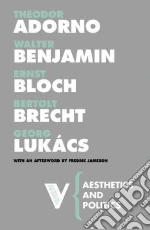 Title :
Aesthetics and Politics
Title :
Aesthetics and PoliticsAuthor: Adorno Theodor W. Publisher: Verso Books No othercountry and no other period has produced a tradition of major aestheticdebate to compare with that which unfolded in German culture from the1930s to the 1950s. In Aesthetics and Politics the key textsof the great Marxist controversies over literature and art during theseyears are assembled in a single volume. They do not form a disparatecollection but a continuous, interlinked debate between thinkers whohave become giants of twentieth-century intellectual history. € 16,10
|
|
|
2006 |
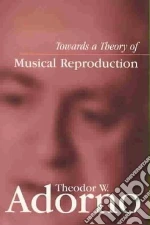 Title :
Towards a Theory of Musical Reproduction
Title :
Towards a Theory of Musical ReproductionAuthor: Adorno Theodor W. Publisher: Polity Pr At the beginning of his career in the 1920s, Adorno sketched a plan to write a major work on the theory of musical reproduction, a task he returned to time and again throughout his career but never completed. The choice of the word reproduction as opposed to interpretation indicates a primary supposition: that there is a clearly defined musical text whose precision exceeds what is visible on the page, and that the performer has the responsibility to reproduce it as accurately as possible, beyond simply playing what is written. This task, according to Adorno, requires a detailed understanding of all musical parameters in their historical context, and his reflections upon this task lead to a fundamental study of the nature of notation and musical sense. In the various notes and texts brought together in Towards a Theory of Musical Reproduction, one finds Adorno constantly circling around an irresolvable paradox: interpretation can only fail the work, yet only through it can musics true essence be captured. While he at times seems more definite in his pronouncement of a musical scores absolute value just as a book is read silently, not aloud his discourse repeatedly displays his inability to cling to that belief. It is this quality of uncertainty in his reflections that truly indicates the scope of the discourse and its continuing relevance to musical thought and practice today. € 28,10
|
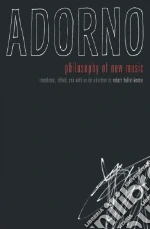 Title :
Philosophy of New Music
Title :
Philosophy of New MusicAuthor: Adorno Theodor W., Hullot-Kentor Robert (TRN) Publisher: Univ of Minnesota Pr In 1947 Theodor Adorno, one of the seminal European philosophers of the postwar years, announced his return after exile in the United States to a devastated Europe by writing Philosophy of New Music. Intensely polemical from its first publication, every aspect of this work was met with extreme reactions, from stark dismissal to outrage. Even Schoenberg reviled it. Despite the controversy, Philosophy of New Music became highly regarded and widely read among musicians, scholars, and social philosophers. Marking a major turning point in his musicological philosophy, Adorno located a critique of musical reproduction as internal to composition itself, rather than as a matter of the reproduction of musical performance. Consisting of two distinct essays, ?Schoenberg and Progress” and ?Stravinsky and Reaction,” this work poses the musical extremes in which Adorno perceived the struggle for the cultural future of Europe: between human emancipation and barbarism, between the compositional techniques and achievements of Schoenberg and Stravinsky. In this completely new translation?presented along with an extensive introduction by distinguished translator Robert Hullot-Kentor?Philosophy of New Music emerges as an indispensable key to the whole of Adorno's illustrious and influential oeuvre. Theodor W. Adorno (1903-1969) was the leading figure of the Frankfurt school of critical theory. He authored more than twenty volumes, including Negative Dialectics (1982), Philosophy of Modern Music (1980), Kierkegaard (Minnesota, 1989), Dialectic of Enlightenment (1975) with Max Horkheimer, and Aesthetic Theory (Minnesota, 1997). Robert Hullot-Kentor has taught at Harvard and Stanford universities and written widely on Adorno. He has translated various works of Adorno, including Aesthetic Theory. € 32,30
|
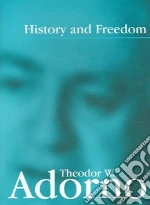 Title :
History And Freedom
Title :
History And FreedomAuthor: Adorno Theodor W., Tiedemann Rolf (EDT), Livingstone Rodney (TRN) Publisher: John Wiley & Sons Inc Despite all of humanity's failures, futile efforts and wrong turnings in the past, Adorno did not let himself be persuaded that we are doomed to suffer a bleak future for ever. One of the factors that prevented him from identifying a definitive plan for the future course of history was his feelings of solidarity with the victims and losers. As for the future, the course of events was to remain open-ended; instead of finality, he remained committed to a Hölderlin-like openness. This trace of the messianic has what he called the colour of the concrete as opposed to mere abstract possibility. Early in the 1960s Adorno gave four courses of lectures on the road leading to Negative Dialectics, his magnum opus of 1966. The second of these was concerned with the topics of history and freedom. In terms of content, these lectures represented an early version of the chapters in Negative Dialectics devoted to Kant and Hegel. In formal terms, these were improvised lectures that permit us to glimpse a philosophical work in progress. The text published here gives us an overview of all the themes and motifs of Adorno's philosophy of history: the key notion of the domination of nature, his criticism of the existentialist concept of a historicity without history and, finally, his opposition to the traditional idea of truth as something permanent, unchanging and ahistorical. € 35,00
|
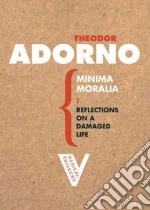 Title :
Minima Moralia
Title :
Minima MoraliaAuthor: Adorno Theodor W., Jephcott E. F. N. (TRN) Publisher: Verso Books A reflection on everyday existence in the 'sphere of consumption of late Capitalism', this work is Adorno's literary and philosophical masterpiece. € 17,90
|
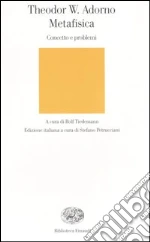 Title :
Metafisica. Concetto e problemi
Title :
Metafisica. Concetto e problemiAuthor: Adorno Theodor W.; Tiedemann R. (cur.); Petrucciani S. (cur.) Publisher: Einaudi Questo libro, che raccoglie le lezioni di Adorno all'Università di Francoforte nel semestre estivo del 1965, si connette strettamente alla sua opera maggiore, la "Dialettica negativa". L'ultima parte del corso ripercorre, infatti, i temi che saranno svolti, a un livello di maggiore complessità stilistica ed espressiva, in quella parte della "Dialettica" che s'intitola "Meditazioni sulla metafisica". Nel corso sulla metafisica Adorno affronta le questioni ultime alle quali la filosofia non può sottrarsi: la difficoltà di pensare dopo Auschwitz, il modo in cui questo evento trasforma l'interrogazione sul senso e rende obsoleta ogni filosofia affermativa, le domande radicali sulla morte e sulla finitezza del singolo, la natura paradossale della trascendenza, che non si lascia né affermare né negare. Nelle lezioni qui pubblicate, però, emerge anche un altro aspetto della riflessione adorniana: il confronto diretto e puntuale con il pensiero di Aristotele, inteso come l'originario momento fondativo della tradizione metafisica dell'Occidente. Nell'interpretazione dei concetti cardine della metafisica aristotelica (universale e particolare, forma e materia, potenza e atto, movimento e motore immobile) emerge l'acume critico del pensatore francofortese, che lo colloca a pieno titolo tra i grandi maestri del Novecento. € 21,00
Scontato: € 19,95
|
|
|
2005 |
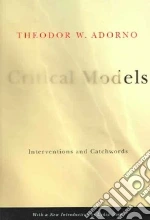 Title :
Critical Models
Title :
Critical ModelsAuthor: Theodor W. Adorno Publisher: UNIVERSITY PRESSES Critical Models combines into a single volume two of Adorno's most important postwar works -- Interventions: Nine Critical Models (1963) and Catchwords: Critical Models II (1969). Written after his return to Germany in 1949, the articles, essays, and radio talks included in this volume speak to the pressing political, cultural, and philosophical concerns of the postwar era. The pieces in Critical Models reflect the intellectually provocative as well as the practical Adorno as he addresses such issues as the dangers of ideological conformity, the fragility of democracy, educational reform, the influence of television and radio, and the aftermath of fascism. This new edition includes an introduction by Lydia Goehr, a renowned scholar in philosophy, aesthetic theory, and musicology. Goehr illuminates Adorno's ideas as well as the intellectual, historical, and critical contexts that shaped his postwar thinking. € 32,90
|
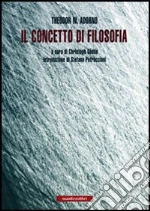 Title :
Il concetto di filosofia
Title :
Il concetto di filosofiaAuthor: Adorno Theodor W.; Gödde C. (cur.) Publisher: Manifestolibri In questo corso di lezioni tenuto nel 1952 a Francoforte, Theodor W. Adorno, il maestro della teoria critica che oggi sta tornando sorprendentemente di attualità, presenta in forma sintetica e colloquiale una breve introduzione alla filosofia e ai suoi problemi fondamentali. Con la chiarezza e la vivacità che contraddistinguono il suo modo di far lezione, Adorno discute in questo corso alcuni concetti fondamentali della tradizione filosofica occidentale: linguaggio ed ermeneutica, storia e dialettica, relativismo e metafisica, empirismo e apriorismo. € 14,50
|
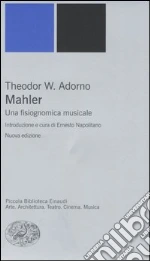 Title :
Mahler. Una fisiognomica musicale
Title :
Mahler. Una fisiognomica musicaleAuthor: Adorno Theodor W.; Napolitano E. (cur.) Publisher: Einaudi Ritorna in una nuova edizione "Mahler. Una fisiognomica musicale", da un lato uno dei culmini in senso assoluto della produzione saggistica di Adorno, dall'altro libro più ardito, sorprendente e rivelatore che sia mai stato scritto sul compositore boemo. Da quando apparve in tedesco nel 1960, infatti, il Mahler adorniano è considerato un classico dell'interpretazione musicale. In questo saggio, in cui confluiscono temi fondamentali che di lí a poco avrebbero trovato sviluppo e sistemazione nella Dialettica negativa, la musica di Mahler pare offrire alla filosofia adorniana irrinunciabili conferme. Eppure, il saggio non nasce come pretesto di speculazione filosofica, né trasforma l'esegesi in dimostrazione. € 18,50
Scontato: € 17,58
|
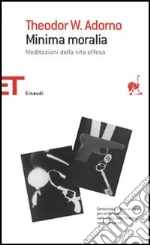 Title :
Minima moralia. Meditazioni della vita offesa
Title :
Minima moralia. Meditazioni della vita offesaAuthor: Adorno Theodor W. Publisher: Einaudi È passato ormai piú di mezzo secolo dagli anni in cui Adorno scrisse queste Meditazioni della vita offesa, che, ormai sottratte alle indigestioni e forzature ideologiche degli anni Settanta, possono essere considerate nella loro prospettiva di ultimo classico tedesco. Attraverso centocinquantatré aforismi, con un'attitudine apparentemente divagante, Adorno ricompone l'intero orizzonte della vita sociale, politica, culturale dell'uomo occidentale, senza rinunciare mai all'idea di un suo possibile riscatto. € 14,00
|
||
|
2004 |
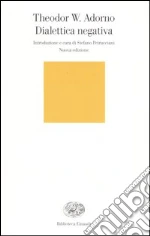 Title :
Dialettica negativa
Title :
Dialettica negativaAuthor: Adorno Theodor W.; Petrucciani S. (cur.) Publisher: Einaudi Scritta tra il 1959 e il 1966 è l'opera più organica e probabilmente il vertice filosofico di Adorno, il sistema di un pensatore profondamente antisistematico. Dopo un'introduzione in cui lo spirito di sistema viene contrapposto al procedimento dell'esperienza filosofica, Adorno avanza una critica dell'ontologia e delinea il movimento della dialettica negativa, che culminando nel riconoscimento del primato dell'oggetto, diventa dialettica materialistica, ma di un materialismo "senza immagini", opposto alla "coscienza reificata" del materialismo dialettico. La dialettica negativa viene poi applicata a "modelli" che corrispondono ad alcuni concetti chiave della filosofia: la libertà, la storia e la metafisica. € 30,00
Scontato: € 28,50
|
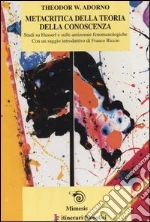 Title :
Metacritica della teoria della conoscenza. Studi su Husserl e sulle antinomie fenomenologiche
Title :
Metacritica della teoria della conoscenza. Studi su Husserl e sulle antinomie fenomenologicheAuthor: Adorno Theodor W. Publisher: Mimesis "Metacritica della teoria della conoscenza" è un testo in cui Adorno nel 1956 raccolse i suoi saggi sulle teorie fenomenologiche di Husserl. Ma il valore di quest'opera è ancor più significativo, in quanto investe il tema più generale della filosofia della scienza e della critica della conoscenza. Adorno rileva come il culto acritico del dato, il mito dell'originarietà e dell'immediatezza e la malcelata subalternità di Husserl stesso nei confronti delle scienze, siano tali da provocare un atteggiamento meramente descrittivo rispetto alla realtà. € 16,00
|

|

|

|

|